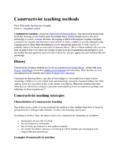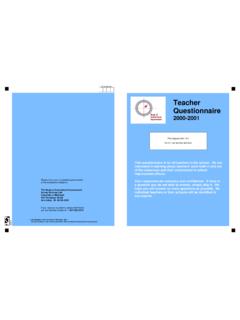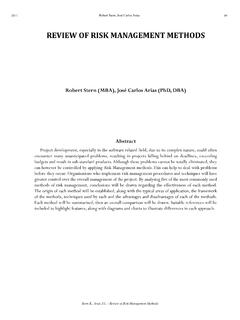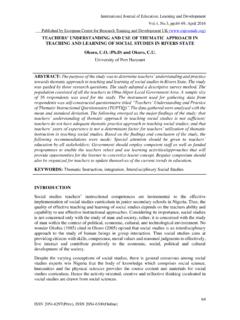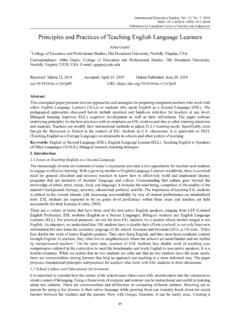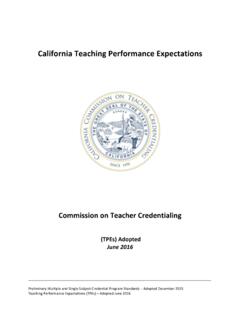Transcription of GENERAL METHODS OF TEACHING - School Learning …
1 GENERAL METHODS OF TEACHINGSESSION IIBy Dr. Meskerem LechissaCollege of Education & Behavioral SciencesOverview 1)Planning sessions 2)Knowing your students3)Designing lesson plans4)Active Learning methods1) Planning sessions What you need: Course goals and description (read and internalize) Course module and sample course guidebooks Information on class beginning and class end Calendar! GENERAL sense of estimated length of time needed for each topicSample plan of sessionsMonTueWedThurFri8 UNIT 1-Intro, the continuum of teacher Learning : apprenticeship of observation 9 -: Pre-service preparation of teachers; Induction 10 CPD; Why teacher education11 UNIT 2-Teacher selection; can TEACHING attract the people it needs?
2 12 Quiz I on Unit 1 (10%)Teacher selection criteria15-16-UNIT 3-Initial teacher edu.: Theoretical orientations(Topics for presentation will be given)17 -: Alternative approaches1819-Curriculum Reflective paper 1 due (10%)2223-Field experiences24-Presentations on unit 3 (15%)2526 presentations on Unit 3 (cont d) Sample plan of sessions2930-Quiz II on Unit 2 & 3 (10%)UNIT 4-Induction of beginning teachers1-Induction of beginning teachers23 -The what and why of CPDR eflective paper 2 due (10%)6-Mid exam 1 (30%)-includes units 1-3 7-The what and why of CPD8-The how of CPD910 The how on CPDP aper on Presentation due (25%)Sample plan of sessions1314-Quiz III on Unit 4 & 5 Challenges in teacher education15-Challenges in teacher education1617-Challenges in teacher educationReflective paper 3 due (10%)
3 20-Mid exam 2 (30%) includes units (4 & 5)21 -Challenges in teacher education22-Challenges in teacher education2324 Constructing the Course Guidebook Components of a course guidebook: Heading (University, semester, Module title, course title, number of credit hour)Educ. 633: Philosophy and Sociology of EducationTeacher Education and Curriculum StudiesBahir Dar University, First Semester, 2008 (2015 G. C.)Meskerem Lechissa, the Course Guidebook Course meeting time, venue, your office location, your office hour, your contact informationCourse Meeting Time: M 2:10 4:00 am.; Tues 4:10-5:00 am. (Local Time)Room-156 Office Hours: Thursday 3:00 6: 00 am. (Local Time)Center for Capacity Building Programs (Block-96, C-5)Phone number 058 220 6966 Email the Course Guidebook Course introduction (course description)Course DescriptionThe course examines the philosophical and sociological foundations of education.
4 It provides a broad overview of many of the philosophical roots of education as well as social inquiring and their relevance for education today. Constructing the Course Guidebook Weekly topics and assigned readings WITH CLEAR EXPECTATIONS:Weekly Topics and Assigned ReadingsEveryweek, (aparagraphortwo) the Course GuidebookWeek 1-IntroductionBrief introduction to Philosophy of Education and Sociology of Education Week 2-Dualism: The Western Worldview Structures of Thinking: Dichotomies versus Bifurcations (Davis, B. (2004). Inventions of TEACHING : A Genealogy. Chapter 1) The Metaphysical Versus the Physical (Davis, B. (2004). Inventions of TEACHING : A Genealogy.)
5 Chapter 2)Girma, M. (2014). Negotiating Indigenous Metaphysics as Educational Philosophy in Ethiopia. Sophia, 53: 3 -The Metaphysical: Gnosis Vs. Episteme Part I Gnosis: Mysticism Vs Religion (Davis, B. (2004). Inventions of TEACHING : A Genealogy. Chapter 4) Mysticism: TEACHING as Drawing Out (Davis, B. (2004). Inventions of TEACHING : A Genealogy. Chapter 5) Religion: TEACHING as Drawing In (Davis, B. (2004). Inventions of TEACHING : A Genealogy. Chapter 6) 4 The Metaphysical: Gnosis Vs. Episteme Part II Episteme: Rationalism Vs Empiricism (Davis, B. (2004). Inventions of TEACHING : A Genealogy. Chapter 7) Rationalism: TEACHING as Instructing (Davis, B.
6 (2004). Inventions of TEACHING : A Genealogy. Chapter 8) Empiricism: TEACHING as Training (Davis, B. (2004). Inventions of TEACHING : A Genealogy. Chapter 9)Week 5 The Physical: IntersubjectivityVs. Interobjectivity Part I Intersubjectivity: Structuralism Vs Poststructuralism (Davis, B. (2004). Inventions of TEACHING : A Genealogy. Chapter 11) Structuralism: TEACHING as Facilitating (Davis, B. (2004). Inventions of TEACHING : A Genealogy. Chapter 12) Poststructuralism: TEACHING as Empowering (Davis, B. (2004). Inventions of TEACHING : A Genealogy. Chapter 13)Week 6 The Physical: IntersubjectivityVs. Interobjectivity Part II Interobjectivity: Complexity Science Vs Ecology (Davis, B.
7 (2004). Inventions of TEACHING : A Genealogy. Chapter 14) Complexity Science: TEACHING as Occasioning (Davis, B. (2004). Inventions of TEACHING : A Genealogy. Chapter 15) Ecology: TEACHING as Conversing (Davis, B. (2004). Inventions of TEACHING : A Genealogy. Chapter 16) 7 Test I-Basic Knowledge TestAny late reading response 8 Sociological Perspective on SchoolingHurn, C. J. (1993). Theories of schooling and society: The functional and conflict paradigms. In C. K. Hurn. The limits and possibilities of schooling: An introduction to the sociology of schooling [pp. 62-74]. Needham Heights, MA: Allyn & , M. W. (1990). On analyzing hegemony. In M. W. Apple, Ideology and Curriculum [2nded] (pp.
8 1-25). New York: Routledge. Readings for subsequent weeks are to be Methodology what METHODS will primarily be used and what the EXPECTED ROLE OF STUDENTS ISMethodologyIn this course, lectures, discussions, and question and answer will be used. You are expected to participate actively by forwarding your reflections, raising questions, sharing your insights and puzzles etc. in class. Advanced preparation is compulsory. Discussions will likely take a form of conversation to create a conducive atmosphere for flexible thinking drawing connections between the readings and contemporary Ethiopian society and its education system. Assessment types and weightsAssessmentTest 1 -Basic knowledge test on philosophy of education (20%)Test 2 Basic knowledge test on sociology of education (20%)Weekly reading response 5% each /12 expected in total/ (60%)2) Knowing Your Students Demographic, educational, aptitude, etc.
9 Composition of your students Name, age, sex, region/home town, first language High School School leaving exam score and current GPA Department Talent areas and hobbies Academic strength Community service interests Dream job Additional academic areas of interest3) Designing Lesson Plans Components of a good lesson plan Topic/Title, date, your name, student group Objectives* Content and task break down Length Activities Assessment planSample lesson plan templateObjectives Bloom s Taxonomy Lesson objectives very important components of instructional planning Objectives determine the contents, METHODS , activities, materials, and assessment mechanisms we select Bloom Domains and Levels of Objectives Cognitive Domain (Knowledge) Psychomotor Domain (Skills) Affective Domain (Attitude) Shoot for all the three in one lesson!
10 Cognitive Domain1. Knowledge: remembering or recalling appropriate, previously learned information to draw out factual (usually right or wrong) answers. Use words and phrases such as: how many, when, where, list, define, tell, describe, identify, etc., to draw out factual answers, testing students' recall and Comprehension: grasping or understanding the meaning of informational materials. Use words such as: describe, explain, estimate, predict, identify, differentiate, etc., to encourage students to translate, interpret, and Application: applying previously learned information (or knowledge) to new and unfamiliar situations. Use words such as: demonstrate, apply, illustrate, show, solve, examine, classify, experiment, etc.





